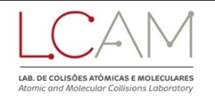Home
Welcome to LCAM Research Group
The Atomic and Molecular Collisions Laboratory (LCAM) was established in 2004 with the main purpose to explore the electronic state spectroscopy of aeronomic, plasma processing, interstellar medium (ISM) and biological relevant molecules by interaction with photons and electrons. LCAM’s unique nature within NOVA School of Science and Technology has allowed to comprehensively investigate environmental selected molecules related to global warming and ozone depletion, while modelling photolysis rates and local lifetimes in the Earth’s atmosphere (0-50 km altitude). Such unique asset has been earlier recognized as a relevant partnership with governmental and non-governmental organizations across the globe for database repositories ever since.
At the forefront of worldwide interest in electron induced processes at the molecular level, LCAM assembled a unique gas-phase crossed molecular beam setup to explore electron transfer to biological relevant molecules, e.g. DNA/RNA nucleobases and even nucleosides. Additionally, and given the role of modern tailor-made radiation induced protocols for cancer treatment, radiosensitizers have been comprehensively investigated in order to provide essential information as to the underlying molecular mechanisms relevant to radiosensitization in redox processes.
Further to LCAM’s mission and installed technical abilities, new gas-phase experimental setups have been successfully installed to explore the electronic and molecular structure of a diversity of molecules, either through high-resolution electron energy loss or He(I) photoelectron spectroscopies. Since its foundation, LCAM keeps relevant international partnerships with universities and reference research laboratories, at the national and international scenes, with the main purpose to reinforce and bring in contributions of complementary experimental and theoretical techniques essential for its indoors scientific achievements. Also central to our mission is undergraduate and postgraduate advanced training which we have successfully performed by attracting national and international students.
Electron Transfer Processes in Atom-Molecule Collisions
The main research goals are the study of the dynamics of negative ions formed by charge transfer in atom-molecule collisions, with the special attention to biomolecular systems. We make use of a crossed molecular beam setup, where a neutral hyperthermal potassium beam (Ko) crosses at right angles an effusive molecular target and the negative ions formed in the interaction region are TOF mass analysed. K+ energy loss in the forward scattering direction is also assessed in an hemispherical analyser;
High Resolution Electron Energy Loss Spectroscopy & He(I) Photoelectron Spectroscopy
We investigate the electronic state spectroscopy of gas-phase molecular targets in dipolar and non-dipolar conditions in a High Resolution Electron Energy Loss Spectroscopy (HREELS) setup;
We have installed a He(I) Photoelectron Spectroscopy (PES) setup for probing low-lying ionic states in molecular targets.
LCAM is a full member within Centre of Physics and Technological Research (CEFITEC) research programme UID/PRR/00068/2025
For further information on Professor Limão-Vieira visit his webpage

RaBBiT – Radiation Biology and Biophysics Doctoral Training Programme


